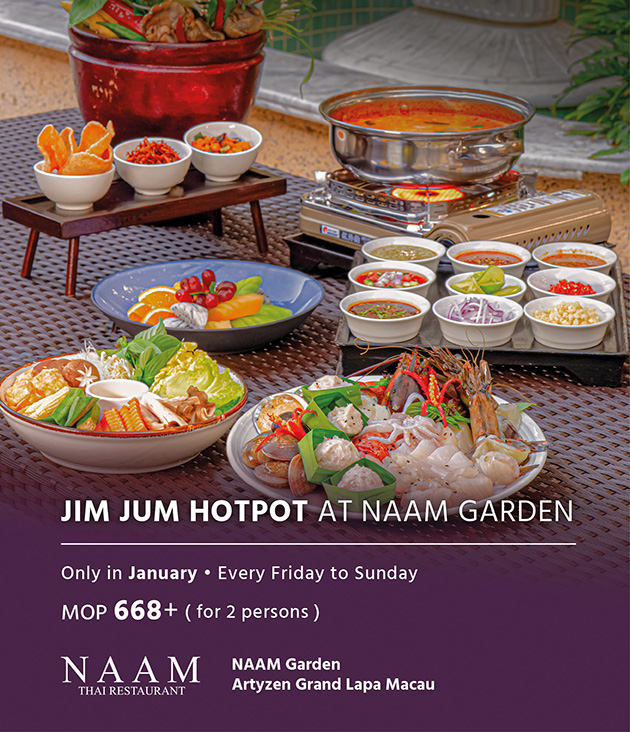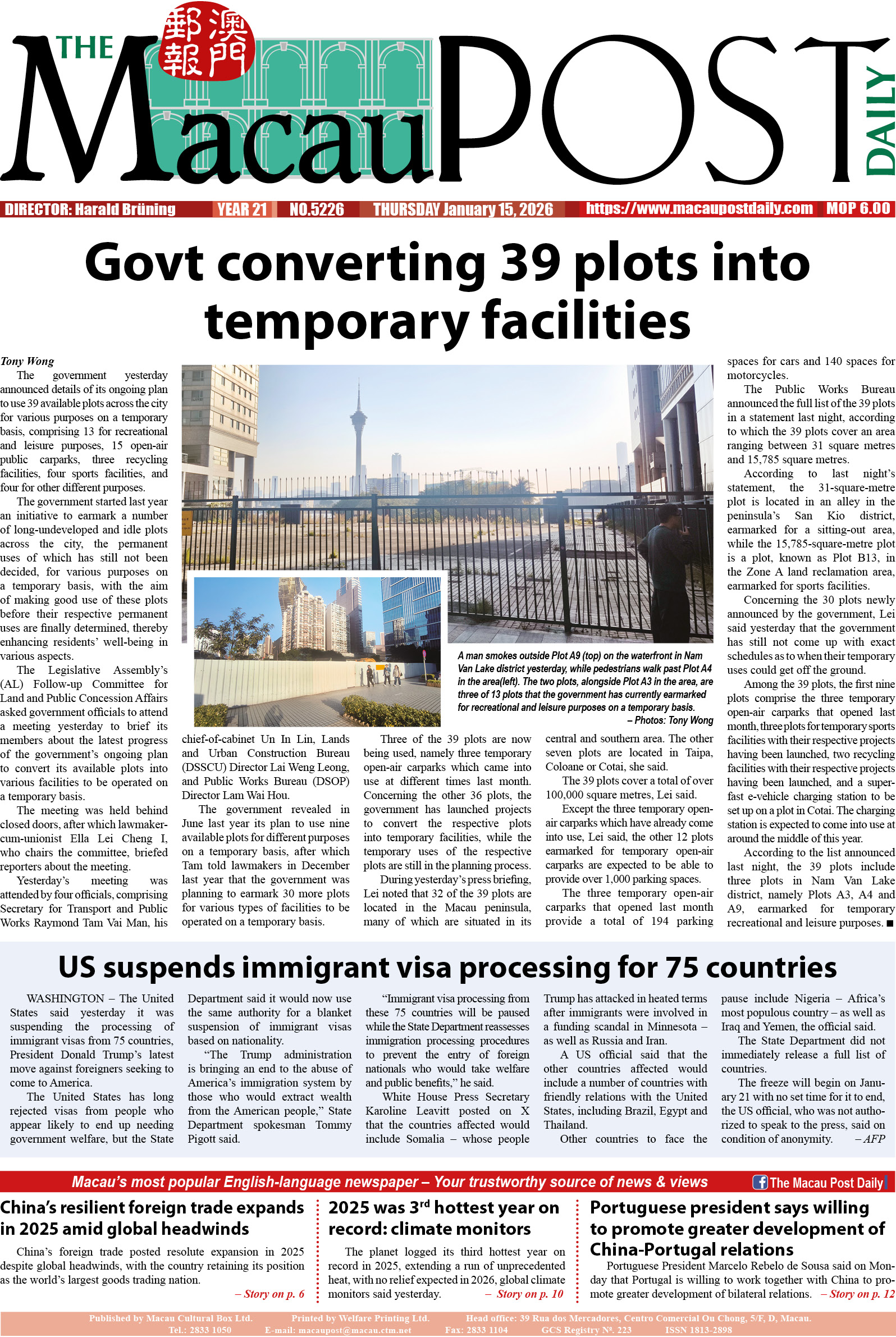Xia Baolong, who heads both the Hong Kong and Macao Work Office of the Communist Party of China (CPC) Central Committee and the State Council’s Hong Kong and Macao Affairs Office (HKMAO), said during his ongoing fact-finding tour that Macau continues to be the motherland’s “pearl in the palm” that should make its “golden business card” shine even brighter.
The remarks, which the 71-year-old veteran official of the central authorities made during a meeting with the Macau Chamber of Commerce on Tuesday, have left a profound impression on me.
“Pearl in the palm” (掌上明珠) is a millennia-old Chinese idiom whose English equivalent is “the apple of one’s eye”, i.e., one’s greatest love.
Xia, a former secretary-general of the National Committee of the Chinese People’s Political Consultative Conference (CPPCC) and economist by profession, also urged local compatriots to make Macau’s “golden business card” shine even brighter by keeping it well polished all the time.
Xia’s remarks were released by the State Council Hong Kong and Macao Affairs Bureau via the Macau Government Information Bureau (GCS). The English version comprises around 1,500 words.
Xia was full of praise for Macau’s development and progress following its change from Portuguese to Chinese administration in December 20, 1999.
Pointing out that the principle of “One Country, Two Systems” with Macau characteristics has been “successfully implemented” in Macau, he underlined that “in the 25 years since its return to the motherland, Macau’s economic development has leapfrogged, its society has maintained long-term stability, residents’ lives have continued to improve, multiculturalism has thrived, the city has a unique appearance, its international clout and international reputation have greatly increased, and it has developed into an international metropolis.”
I am quite sure that hardly anyone disagrees with his remarks. As a four-decade-long local resident, I can vouch for that.
Xia also underlined that Macau has always stuck together and shared weal and woe with the motherland. That’s certainly one of Macau’s main characteristics and most salient difference from Hong Kong.
Xia, who arrived here on Monday and is slated to wind up his “investigation and research” tour on Sunday, also said that Macau has succeeded in creating its “best ever” environment for development and “leveraged its unique positioning and advantages to lay a solid foundation for sustainable development.
And Xia also emphasised Macau’s institutional advantage – “One Country, Two Systems” – as “the best constitutional arrangement for maintaining Macau’s long-term stability and prosperity”. And he stressed that “fully supported by the nation, Macau is like its “pearl in the palm”.
Back in the early 1980s, when I first visited Macau, locals proudly described their city as the “Pearl of the Orient”. At that time, Macau had just, rather timidly, started its modernisation drive, as its development was still eons behind Hong Kong’s. I also remember local Chinese residents as identifying themselves strongly with their nation.
Xia listed a string of statistical data to back up his remarks. As Statistics was one of my favourite subjects as university, my ears always prick up when listening to someone mentioning data in their speech or article (in Xia’s case, I did read his remarks after returning from a quick shopping trip across the outstanding Hong Kong-Macau-Zhuhai Bridge to the Citygate Outlets mall in Tung Chung during the Buddha’s Birthday holiday).
‘No longer a tiny city’
Xia underlined that when Macau returned to the motherland in 1999, it had a land area of only 21.45 sq.km. Thanks to massive land reclamation, it now measures 33.3 sq.km. In 2015, the central authorities granted Macau jurisdiction over 85 sq.km of its coastal waters (historically, Macau did not have control over its coastal waters). Moreover, in 2021, the central authorities set aside an area of 106.46 sq.km for the Guangdong-Macau In-depth Cooperation Zone in Hengqin, based on the new system, as Xia pointed out, of “mutual discussions, joint construction, joint administration and shared benefits,” thus expanding Macau’s area for development to 224.76 sq.km. “Macau is no longer a tiny city,” Xia said, who stressed that Macau’s total development area has expanded more than ten times since 1999.
Xia, who holds a doctorate in Economics, also noted that Macau has formalised economic and trade relationships with more than 120 countries and regions, and the Macau Special Administrative Region (MSAR – known as “Macao, China” on the stage of international relations) is now a member of over 190 international organisations and entities. Besides, MSAR passport holders are granted visa-free access or visas on arrival by 145 countries and regions, i.e., about three-quarters of the 193 member states of the United Nations.
Xia also noted that Macau has one of the world’s lowest business income tax rates and is recognised by the World Trade Organisation (WTO) as one of the most open economies for trade and investment in the world. He also underlined that since the establishment of the locally-based 10-nation Forum Macao, trade between China and the world’s nine Portuguese-speaking countries (PSCs) has risen by 20 times.
Furthermore, Xia praised Macau for having been able to leverage its strong economic foundation. He singled out the fact that Macau’s GDP has grown from 51.9 billion patacas in 1999 to 444.5 billion patacas in 2019 – an increase of 756.4 percent in a mere two decades. I estimate that it nothing short of a world economic world growth record. Based on purchasing power parity (PPP) calculations of its per capita GDP, Macau ranked fifth in the world last year, Xia said. Unofficial estimates have put Macau recently even at the top of the world’s per capita GDP. Well, let’s wait for official, solidly calculated figures, but I have little doubt that Macau will rank, ceteris paribus, among the top three this year.
Xia also singled out Macau’s fiscal reserves of around 580 billion patacas (US$72.6 billion). I presume that, comparatively speaking, Macau boasts the world’s highest fiscal reserves in the world, apart from the extremely rare fact that there is no public debt to speak of in Macau. Most economies, including the world’s supposedly “richest” nations, are mired in public debt, some of them of unfathomable proportions.
Xia also praised Macau’s “1+4” appropriate economic diversification strategy.
According to previous local government statements, the “1+4” strategy aims to reinforce Macau’s function as “One Centre” for integrated tourism and leisure, officially known as World Centre of Tourism and Leisure, while facilitating the development of four nascent industries, namely: the “Big Health” industry; modern financial services; high and new technology; and conventions and exhibitions, sport, and the commercial and trade industries.
Xia also pointed out that “Macau enjoys the advantage of multiculturalism”, consisting of the coexistence of multiple religions, diverse languages, various kinds of architecture and the friendly coexistence among various ethnicities. All this, he said, reflects the distinctive characteristics and unique value of the intersection of Chinese and Western cultures in Macau. He also singled out Macau’s inscription on the UNESCO World Heritage list and its designation as a Creative City of Gastronomy” by the Paris-based organisation, resulting in “beautiful Macau’s tourism business card.” He also mentioned Macau’s “traditional passion of patriotism and loyalty” vis-à-vis the motherland, as well as the fact that, post-1999, it is “one of the safest cities in the world”.
Reminding his audience at the Macau Chamber of Commerce that this year marked the 75th anniversary of the founding of the People’s Republic of China (PRC) and the 25th anniversary of the establishment of the MSAR, he stressed that “we must fully support the chief executive and the MSAR government in governing in accordance with the law, better leverage Macau’s unique status and advantages, promote high-quality economic and social development and work together to make Macau’s ‘golden business card’ shine even brighter.”
My personal view as a long-time resident is that in order to make Macau’s “golden business card” as an international metropolis even more “polished” than it already is, government and civil society should do their best to improve the local tourism sector’s service quality (well, reaching the level of Bangkok or other top international tourist destinations should be the ultimate goal), upgrade public transport by planning beyond the completion of the Light Rail Transit (LRT) system and, last but certainly not least, spruce up our city’s neighbourhoods that potentially could become new tourist attractions but are in urgent need of an urban revamp, considering that both the government and business sector are keen to develop the city’s “community tourism”. Let’s be realistic – in order to be able to attract tourists, Macau’s lesser-known neighbourhoods, such as the northern district, must be spiffed up first, which should be a public-private partnership endeavour.
Xia’s 4 suggestions
Xia also made four suggestions to achieve Macau’s various development targets.
First, further contributions should be made to promote Macau’s appropriate economic diversification, namely by focusing on the government “1+4” development strategy.
Second, further contributions should be made to integrate the MSAR into the national development plan, including the Guangdong-Hong Kong-Macau Greater Bay (GBA), the Belt and Road Initiative (BRI) and by supporting the local government’s ongoing effort to develop the Guangdong-Macau In-depth Cooperation Zone (which includes the emerging Macau New Neighbourhood/MNN).
Third, further contributions should be made to enhance Macau’s international clout, broadening its connections with the EU, Southeast Asian countries and the PSCs.
Fourth, further contributions should be made to advocate Macau’s long-standing tradition of being loyal to the country and to Macau, continue supporting the strengthening of patriotism, and building the broadest possible consensus on social development.
Xia concluded his remarks by expressing confidence in Macau being able to further widen the scope of its successful implementation of the “One Country, Two Systems” principle so that the new-era train called “Macau” will run in a fast and stable manner.
Xia’s last visit, which took place a year ago, lasted “only” four days. This time, his fact-finding tour lasts seven days, another indication of the central authorities’ elevated degree of attention they are paying to Macau’s future. Xia’s last visit to Hong Kong early this year also lasted seven days, which reaffirms my long-held view that both SARs deserve Beijing’s equal heedfulness, irrespective of the stark differences between the two in terms of population and land area, and economic and financial might. However, in terms of per capita GDP, present-day Macau is no longer Hong Kong’s “poor cousin” nor “the sleepy enclave” – as some Hong Kong media condescendingly used to call Macau less than three decades ago.
Of course, without Beijing’s strong backing over the past quarter of a century, Macau would never have been able to become what it is now – one of the richest places on Earth.
– Harald Brüning







